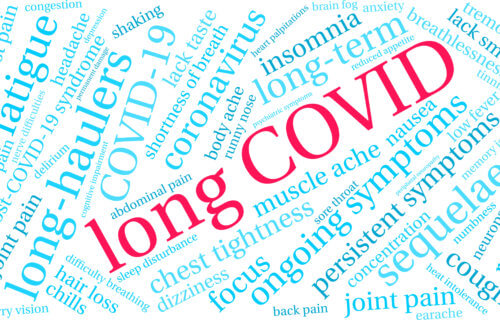HERSHEY, Pa. — A disturbingly high percentage of people who recover from symptomatic COVID-19 continue to struggle with lingering “long COVID” symptoms for months after the fact. It’s been a worrying trend since the beginning of the coronavirus pandemic. Now, researchers from Penn State report that over half of the 236 million people with COVID-19 worldwide since the pandemic began since will indeed experience long COVID symptoms.
Study authors warn that governments, doctors, and health care organizations should all prepare themselves for an ever-increasing number of long COVID patients in need of treatment for a variety of physical or psychological symptoms. According to the new report, both adults and children may experience several potential health issues for as long as six months post-recovery.
The team analyzed a total of 57 prior studies focusing on COVID-19 patients during this project, encompassing 250,351 unvaccinated adults and children with COVID-19 between December 2019 and March 2021. Among that entire group, 79 percent ended up needing hospitalization for their infection. Most of those hospital patients lived in high-income nations with an average age of 54 years-old. Researchers assessed each person’s post-COVID health on three occasions: one month after recovery, two to five months afterward, and six or more months later.
Overall, one in two patients dealt with long COVID symptoms. In the vast majority of cases, these symptoms interfered with the individual’s mobility, organ function, or well-being. Most long COVID symptoms persisted for at least six months.
More specifically, over half of all patients reported experiencing weight loss, fatigue, fever, or pain. Another one in five lost mobility and close to one in four had a harder time concentrating after COVID-19. Troublingly, doctors diagnosed close to one in three patients with generalized anxiety disorder after recovering.
Long COVID can continue to affect the lungs and heart
COVID-19 is notorious for attacking the lungs. Six in 10 patients displayed chest imaging abnormalities while over a quarter reported difficulty breathing. As far as heart issues, the most common long COVID complaints were increased chest pain and more frequent heart palpitations. Another 20 percent reported hair loss or the development of a rash. Many others dealt with stomach problems like diarrhea, stomach pain, and lack of appetite.
“These findings confirm what many health care workers and COVID-19 survivors have been claiming, namely, that adverse health effects from COVID-19 can linger,” says co-lead investigator Vernon Chinchilli, chair of the Department of Public Health Sciences, in a university release. “Although previous studies have examined the prevalence of long COVID symptoms among patients, this study examined a larger population, including people in high-, middle- and low-income countries, and examined many more symptoms. Therefore, we believe our findings are quite robust given the available data.”
“The burden of poor health in COVID-19 survivors is overwhelming,” adds co-lead investigator Dr. Paddy Ssentongo, assistant professor at the Penn State Center for Neural Engineering. “Among these are the mental health disorders. One’s battle with COVID doesn’t end with recovery from the acute infection. Vaccination is our best ally to prevent getting sick from COVID-19 and to reduce the chance of long-COVID even in the presence of a breakthrough infection.”
What’s causing these lingering symptoms?
Unfortunately, scientists are still uncertain as to what exactly is causing long COVID. The immune system entering “overdrive,” lingering infection, increased production of autoantibodies, and reinfection are all possibilities at this point. Since SARS-CoV-2 is capable of entering the nervous system, symptoms including loss of taste or smell, memory decline, and concentration issues are all common among COVID-19 survivors.
“Our study was not designed to confirm COVID-19 as the sole cause of these symptoms. It is plausible that symptoms reported by patients in some of the studies examined were due to some other causes,” Dr. Ssentongo notes.
Study authors add early intervention and treatment is going to be essential to helping long COVID patients maintain a certain quality of life. Doctors should be prepared for an influx of new patients complaining of issues they had never experienced prior to COVID and, at this point in the pandemic, health care facilities should be prepared to identify and treat long COVID symptoms.
“Since survivors may not have the energy or resources to go back and forth to their health care providers, one-stop clinics will be critical to effectively and efficiently manage patients with long COVID,” Dr. Ssentongo concludes. “Such clinics could reduce medical costs and optimize access to care, especially in populations with historically larger health care disparities.”
The study appears in the journal JAMA Network Open.
